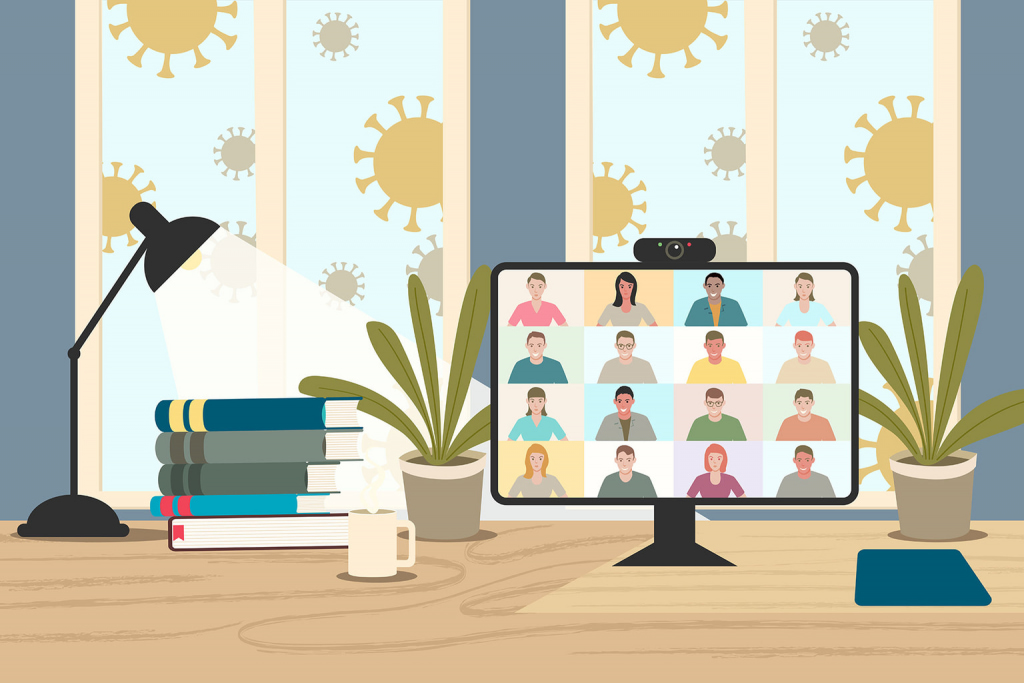I’ve lived in Japan for over 30 years and until this pandemic hit us, I don’t recall ever wearing a mask. I was one of those who thought I’d attract too much attention as a foreigner in a mask, or at the least, look silly.
Now, a year later, I find that NOT wearing a mask when venturing out into public spaces is what will make me look like the outcast. These days I’ll walk out of a shop and completely forget I have it on. When I see someone without a mask on, or their mask pulled below their nose, I have to bite my tongue to keep from berating them. I figure it’s better to just keep my distance rather than risking a punch in my masked nose.
The Zoom Family
Pre-Covid, my calls to family back in the States was usually done on Facetime or sometimes Skype. As part of my Covid-induced learning I am now fairly an expert on using Zoom or most any of the other video conferencing platforms available. In the days of Facetime it was usually a one-on-one call with each of our children in the US, but using Zoom I’ve discovered just what a talkative and noisy family we are! In a business call most people have learned that they should mute themselves while others are talking, but it’s pretty hard to mute kids and grandkids when everyone is having a good time catching up and enjoying the call.
Small Business, Big Impact
Like many businesses, my business – a recruiting and executive search firm – took a hit in the first couple of months of the start of the pandemic in Japan. Companies weren’t sure how long this thing was going to last. Employees of client companies didn’t know if they should report to work or stay home.
I was pleasantly surprised though to see how quickly companies adapted to a work-from-home culture. Our company did the same and for the first two months we all worked from our home setups. Fortunately, we already had phone and technology systems in place to enable us to do that with little to no disruption in our routines, other than to abandon the daily commute to the office.
Like many small businesses, we scrambled to keep things running as well as possible. We researched and applied for government grants, which to give credit where credit is due, the government managed to do quickly.
The Future is Online
As companies determined that this situation was going to go on for quite some time things began to pick up. Again, in my opinion that shows the versatility of the Japanese populace and the willingness on the part of management to accept change. Companies quickly adapted to phone and video meetings with candidates and many companies are even doing their onboarding of new hires through online training, webinars and other tech methods.
I think that this use of technology is something that will continue into the future for most companies as they’ve learned to appreciate the efficiency of meetings that don’t require travel, or don’t have to be face-to-face. When the second government request to “stay home” started in January this year, we were ready and able to quickly transition back to a work-from-home situation.
Flexibility is King
From a personal standpoint, I’ve discovered that I don’t miss the daily commute, and I’ve found a lot of new walking areas in my home neighborhood since my regular gym visits have been curtailed.
Working-from-home is fine, but I also know that our team misses the “buzz” of working together in the office. Meetings on Zoom are great for keeping in touch, but for that feeling of close camaraderie nothing beats being together as a team. I believe that this pandemic situation has helped everyone realize that even more.
We will continue to offer our team the option to WFH when they feel the need, and I have learned that being flexible in the hours in the office is a good thing too.








